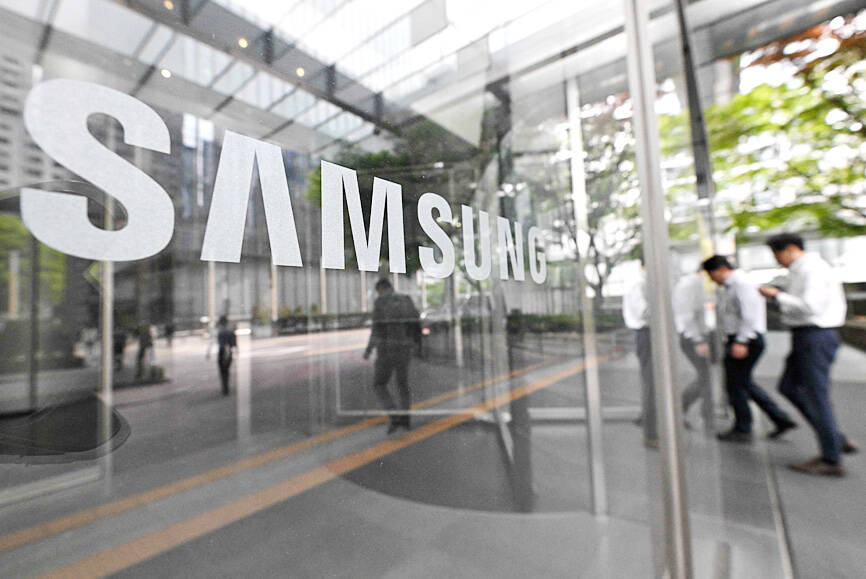Samsung Electronics Co yesterday reported a 10-fold annual increase in operating profit for the first quarter of the year as the expansion of artificial intelligence (AI) technologies drives a rebound in the markets for computer memory chips.
The South Korean semiconductor and smartphone giant said its operating profit for the January-to-March quarter came in at 6.6 trillion won (US$4.8 billion), up from the 640 billion won it earned during the same period last year.
Revenue rose 12.8 percent to 71.9 trillion won, driven by higher prices for memory chips and robust sales of its flagship Galaxy S24 smartphones, the company said.

Photo: AFP
Samsung earned 1.91 trillion won in operating profit from its semiconductor business, marking the division’s first quarterly profit since the fourth quarter of 2022, as the chip market continues to recover from a cyclical slump deepened by the COVID-19 pandemic and global trade tensions.
The company projected that the memorychip market would remain robust in the coming months, driven by the expansion of generative AI technologies, which are increasing demand for conventional chips used in servers and advanced chips designed to process AI, including high-bandwidth memory (HBM).
Responding to increased demand for AI chips, Samsung last month started mass production of its latest HBM chips — 8-layer HBM3E — and plans to start producing the 12-layer version of the chips during the second quarter, the company said.
“In the second half of 2024, business conditions are expected to remain positive with demand — mainly around generative AI — holding strong, despite continued volatility relating to macroeconomic trends and geopolitical issues,” Samsung said in a statement.
For smartphones, the company would continue to focus on boosting sales of its flagship device, the Galaxy S24, which is built with an array of new features enabled by AI, including live translation during phone calls in 13 languages and 17 dialects.
Samsung said it plans to expand AI features beyond the S24 to other mobile devices as it expects the technologies to drive growth in the smartphone market in the coming months amid improvements in global consumer spending.

Taiwan’s long-term economic competitiveness will hinge not only on national champions like Taiwan Semiconductor Manufacturing Co. (TSMC, 台積電) but also on the widespread adoption of artificial intelligence (AI) and other emerging technologies, a US-based scholar has said. At a lecture in Taipei on Tuesday, Jeffrey Ding, assistant professor of political science at the George Washington University and author of "Technology and the Rise of Great Powers," argued that historical experience shows that general-purpose technologies (GPTs) — such as electricity, computers and now AI — shape long-term economic advantages through their diffusion across the broader economy. "What really matters is not who pioneers

In a high-security Shenzhen laboratory, Chinese scientists have built what Washington has spent years trying to prevent: a prototype of a machine capable of producing the cutting-edge semiconductor chips that power artificial intelligence (AI), smartphones and weapons central to Western military dominance, Reuters has learned. Completed early this year and undergoing testing, the prototype fills nearly an entire factory floor. It was built by a team of former engineers from Dutch semiconductor giant ASML who reverse-engineered the company’s extreme ultraviolet lithography (EUV) machines, according to two people with knowledge of the project. EUV machines sit at the heart of a technological Cold

TAIWAN VALUE CHAIN: Foxtron is to fully own Luxgen following the transaction and it plans to launch a new electric model, the Foxtron Bria, in Taiwan next year Yulon Motor Co (裕隆汽車) yesterday said that its board of directors approved the disposal of its electric vehicle (EV) unit, Luxgen Motor Co (納智捷汽車), to Foxtron Vehicle Technologies Co (鴻華先進) for NT$787.6 million (US$24.98 million). Foxtron, a half-half joint venture between Yulon affiliate Hua-Chuang Automobile Information Technical Center Co (華創車電) and Hon Hai Precision Industry Co (鴻海精密), expects to wrap up the deal in the first quarter of next year. Foxtron would fully own Luxgen following the transaction, including five car distributing companies, outlets and all employees. The deal is subject to the approval of the Fair Trade Commission, Foxtron said. “Foxtron will be

INFLATION CONSIDERATION: The BOJ governor said that it would ‘keep making appropriate decisions’ and would adjust depending on the economy and prices The Bank of Japan (BOJ) yesterday raised its benchmark interest rate to the highest in 30 years and said more increases are in the pipeline if conditions allow, in a sign of growing conviction that it can attain the stable inflation target it has pursued for more than a decade. Bank of Japan Governor Kazuo Ueda’s policy board increased the rate by 0.2 percentage points to 0.75 percent, in a unanimous decision, the bank said in a statement. The central bank cited the rising likelihood of its economic outlook being realized. The rate change was expected by all 50 economists surveyed by Bloomberg. The